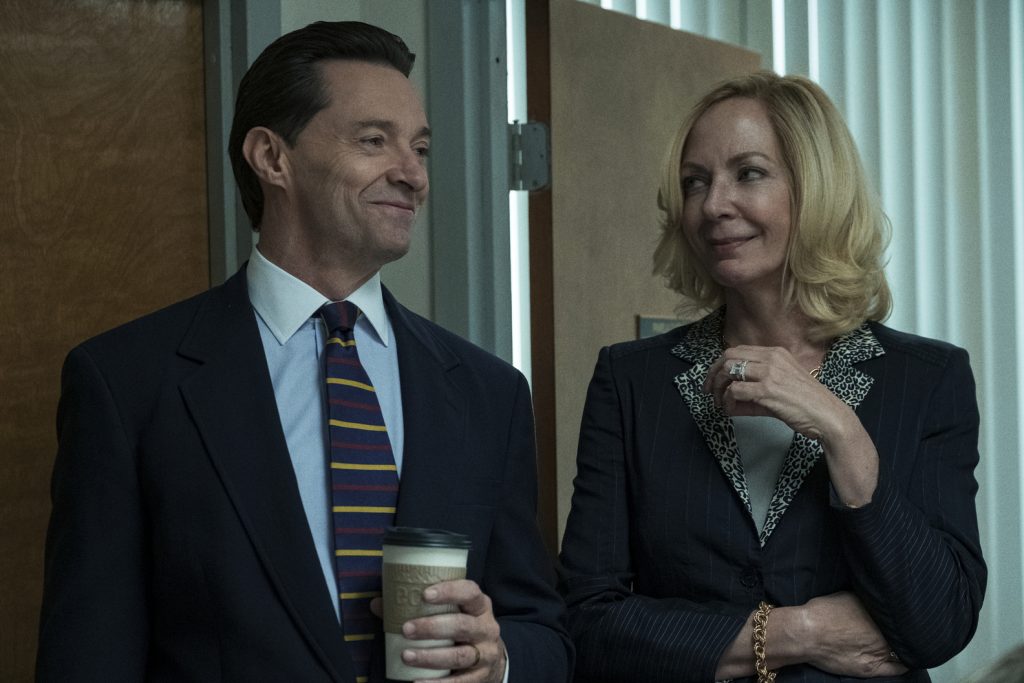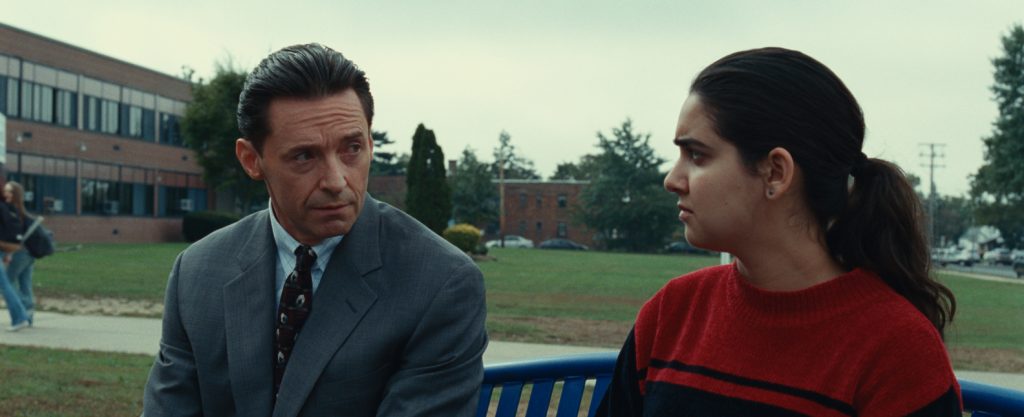April 26, 2020
by Carla Hay

Directed by Cory Finley
Culture Representation: Taking place primarily on Long Island, New York, and partially in Las Vegas, the drama “Bad Education” has a predominantly white cast of characters (with some Indian Americans) representing the middle-class and upper-class.
Culture Clash: Based on true events, the movie tells the story of corrupt administrators and their accomplices, who embezzled an estimated $11 million from the school district of Roslyn High School in Roslyn, New York.
Culture Audience: “Bad Education” will appeal primarily to Hugh Jackman fans and people who like dramas based on true crime.

“Bad Education” follows many familiar tonal beats of true-crime movies, but the riveting performances of Hugh Jackman and Allison Janney elevate what could have been a somewhat mediocre film. Based on true events that happened in 2002, “Bad Education” portrays the investigation that led to the downfalls of several people involved in an embezzlement/fraud scam that stole an estimated $11 million over several years from the high-school district in the upscale suburban city of Roslyn, New York. It’s said to be the largest prosecuted embezzlement in the history of American public schools.
The two people at the center of the crimes against Roslyn High School are school superintendent Frank Tassone (played by Jackman) and assistant superintendent/business manager Pam Glucklin (played by Janney), who work closely together and also cover up for each other. As it’s eventually revealed in the movie, they cared about more than just increasing the prestige level of Roslyn High School, the high-ranking jewel in their school-administration crown. They also cared a great deal about increasing their personal wealth using illegally obtained school funds, mostly by billing the district for lavish trips, homes, cars and other personal expenses.
In the beginning of the film, which is effectively bookmarked with a similar scene at the end of the film, Frank is introduced like a rock star at a school assembly, which has gathered to celebrate Roslyn High School’s achievement of ranking at No. 4 in the U.S. for being the highest academically achieving high school. The school has reached this level under Frank’s leadership, and his goal is to elevate Roslyn High School to No. 1.
Frank’s friendly charm and winning smile have made him very popular with his co-workers, parents and students. By contrast, Pam has a prickly and dismissive personality, but her strong alliance with Frank has given her a lot of clout in the school district. Their boss is school board president Bob Spicer (played by Ray Romano), who is Frank’s biggest champion.
One of the school’s goals is a skywalk proposal, which would build a multimillion-dollar skywalk bridge to link the school from end to end. A bright and inquisitive student named Rachel Bhargava (played by Geraldine Viswanathan) is tasked with doing an article about the skywalk for Roslyn High School’s newspaper, The Beacon. At first, when she does a very brief interview with Frank for the article, she thinks it’s going to be a boring puff piece.
Rachel thinks so little of the assignment that she even tells Frank that it will be a puff piece. His response: “It’s only a puff piece if you let it be a puff piece. A real journalist can turn an assignment into a story.” It’s unknown if the real Frank Tassone ever said those words to any of the real student reporters of The Beacon who broke the news of the embezzlement scandal, but those words will come back to haunt Frank in this movie.
While preparing the article, Rachel needs to get some facts and statistics about the skywalk construction proposal bids that the school district received from contractors. She has to get permission from Pam to access those documents, which are in a very cluttered storage area of the school. While Frank was accommodating and gracious in giving his time to Rachel, Pam is impatient and condescending when talking to Rachel for the article. Pam gives Rachel the room key to access the requested documents, but warns her that the area is so messy and disorganized that it will be challenging for her to find the paperwork that she’s seeking.
The storage area turns out to have a treasure trove of documents that Rachel’s assigning editor Nick Fleischman (played by Alex Wolff) happens to notice when he accidentally knocks some of the papers out of her backpack when he impatiently tries to stop her while walking down a school hallway. (It’s one of those moments in the movie that probably didn’t happen in real life, but was fabricated for dramatic purposes.)
Nick thinks she may be on to a big story, so Rachel finds out through further investigation that the documents have a lot of proof that invoices charging a fortune have been billed to the school district, but many of the companies listed on the invoices don’t exist. Rachel gets help from her father David Bhargava (played by Hari Dhillon) in doing the grunt work of making calls to investigate the legitimacy of companies that are listed on the school invoices.
Why does Rachel’s father have that much free time on his hands? In a minor subplot, it’s revealed that he lost his job because of accusations that he was involved with insider trading. In the midst of investigating corruption at her own school, Rachel at one point asks her father if he really was guilty of insider trading. His answer serves to telegraph Rachel’s decision to report what she’s found out.
What happens next has a domino effect that exposes elaborate, longtime schemes orchestrated by Frank and Pam. Because of this high-profile case, many viewers might already know about the outcome. However, screenwriter Mike Makowsky (a Roslyn native who graduated from high school seven years after the scandal) and director Cory Finley infuse the movie with enough suspense and sly comedy to make it a slightly better-than-average telling of a crime story.
“Bad Education” takes a sometimes sardonic look at how manipulative and cunning Frank was in covering up his crimes. He was a man of many faces—literally, since his vanity facelifts and meticulous application of makeup are shown in the movie—and many secrets, which he covered up with a web of lies that eventually unraveled. Even in his personal life (Frank was a closeted gay man), he deceived the people who were closest to him. The movie is also a takedown of the weak-willed enablers who knew about the corruption, but were complicit in covering it up because they didn’t want to lose their jobs and they wanted to keep up the appearance that they had an ideal school district.
Frank also mastered the art of deflection, so that when he was under scrutiny, he was able to turn it around on potential accusers to make them afraid of getting in trouble for not detecting the problem earlier. He also used, to his advantage, the administration’s fixation on increasing the prestige of Roslyn High School, which tied into many administrators’ ulterior motives of raising the property values in Roslyn too.
Janney doesn’t have as much screen time as Jackman does, but she makes the most of characterizing Pam as being more than just a selfish and greedy shrew. The movie shows how she was generous to a fault in sharing her illegally funded wealth with her family. That generosity would turn out to be her downfall, since she allowed certain family members to use school credit cards to fund their lavish personal spending. The family members who were also part of the widespread scam included Pam’s husband Howard Gluckin (played by Ray Abruzzo); Jim Boy McCarden (played by Jimmy Tatro), her son from a previous marriage; and her co-worker niece Jenny Aquila (played by Annaleigh Ashford), who relies on Pam for financial help.
All of these family members are dimwitted in some way—they didn’t do much to hide their identities in the paper trail that exposed their crimes—but Jenny is portrayed as particularly loathsome. At one point in the movie, even after some of the crimes were exposed, Jenny tries to take over her aunt/benefactor Pam’s job at the school. Jenny also makes a pathetic and botched attempt to blackmail Frank, who quickly puts Jenny in her place and reminds her that she’s no match for him and his devious manipulations.
When Pam’s world starts to unravel, Janney uses subtle cues in showing how this character’s carefully constructed façade starts to crumble, as her perfectly posh, enunicated English starts to give way to a very working-class Long Island accent. Pam is so obsessed with keeping up appearances that she makes the mistake of being too loyal to Frank when things start to crash down on them.
“Bad Education” is a very Hollywood version of a seedy true crime story. In real life, none of the people were as glamorous-looking as the actors who portray them in the movie—although, in real life, the embezzlers spent money as if they were Hollywood celebrities. The movie accurately shows that people got away with crimes of this length and magnitude because they were able to fool others by having a “respectable” image. The ending scene effectively illustrates that Frank’s inflated ego and arrogance led him to believe that he was a legend in his own mind—and the results were reckless crimes that destroyed school finances, careers and people’s trust.
HBO premiered “Bad Education” on April 25, 2020.
